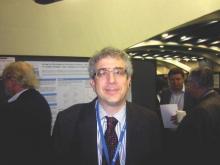SAN FRANCISCO – The addition of abatacept (Orencia) to standard prednisone regimens seemed to reduce the risk of relapse in a study by the Vasculitis Clinical Research Consortiumof 49 patients with giant cell arteritis.
The patients were initially treated with 40-60 mg of prednisone daily on a standard taper plus abatacept 10 mg/kg IV on days 1, 15, and 29, and week 8. The 41 patients who were in remission at week 12 were then randomized to continued abatacept or placebo IV once monthly. Prednisone was stopped at week 28.
By the time the study concluded a year after the last patient was randomized, 10 abatacept patients had relapsed and 10 had stayed in remission, while 14 placebo patients had relapsed and 7 had stayed in remission. Relapse-free survival at 12 months was calculated to be 48% in the abatacept group and 31% in the placebo group (P = .049). A longer median duration of remission was seen with abatacept, as well (9.9 months versus 3.9 months with placebo).
“Abatacept prolonged the rate of relapse-free survival and was associated with a favorable safety profile.” These are “very encouraging results supporting abatacept” for giant cell arteritis (GCA), lead investigator Dr. Carol Langford, director of the Center for Vasculitis Care and Research at the Cleveland Clinic, said at the annual meeting of the American College of Rheumatology.
There were 129 adverse events in 35 patients, including 33 infections and three malignancies; 23 adverse events in 15 patients were deemed serious.
Even so, “there was no difference in the frequency or severity of adverse events between treatment arms, including the rate of infection,” and “no evidence of enhanced toxicity during the first 3 months [when] patients received abatacept and high-dose prednisone,” the investigators said.
While steroids remain the standard of care, “positive signals for new drugs in GCA will [give us] the opportunity to refine their use,” perhaps, for example, by allowing for a lower steroid dose up front, said Dr. Peter Merkel, chief of rheumatology at the University of Pennsylvania in Philadelphia.
Patients in the abatacept arm were 64 years old on average, while placebo patients were about 72 years old. All of the placebo patients and 80% of the abatacept patients were women, and most of the subjects were white. Median disease duration was a few months in both groups.
There were no statistically significant differences in GCA characteristics between the groups at time of enrollment. Vascular pain, headaches, and tongue and jaw pain were common in both. One patient in both arms had ischemic retinopathy.
Abatacept counters T cell activation, which has been implicated in the pathophysiology of GCA. Promising results for tocilizumab (Actemra) in GCA also were presented at the annual meeting.
The National Institutes of Health funded the study. Bristol-Myers Squibb provided the abatacept. Nearly all of the investigators, including Dr. Merkel and Dr. Langford, disclosed relationships with the company.



